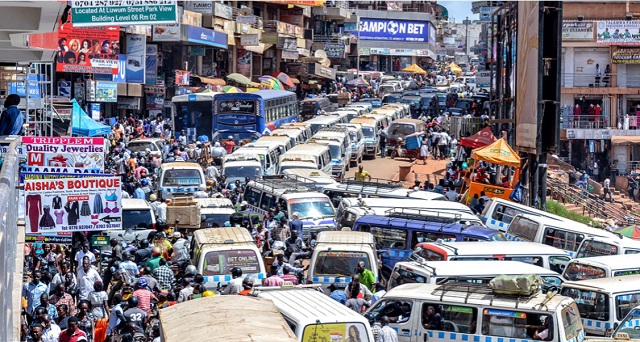
Phasing out 14-seater taxis, boda bodas in the city is welcome but needs time to implement
Kampala, Uganda | ISAAC KHISA | Those who drive or commute in Kampala City can attest that a lot has changed over the past decades. Public transport service has become busy and messy. Passengers have steeply increased and so is the traffic jam – clocking almost all the city centre’s arteries.
It is on this basis that when the Minister in charge of Kampala, Betty Amongi, announced recently that there’s a plan to introduce various measures including operationalisation of the city bus project, restriction of 14-seater taxis commonly known as Kamunye and establishment of boda boda free-zones in the city centre, subject to cabinet approval, there was excitement among a section of the commuters.
This came a few days after Amongi, together with finance minister, Matia Kasaija, presented a $12million loan request to the Parliament’s committee on the national economy.
The loan, among others, is supposed to operationalise a city bus project and create a dedicated bus lane plying a 15km corridor from the Constitutional Square-Jinja Road-Nakawa junction to Ntinda, then Bukoto to Kamwokya, Mulago to Wandegeya and back to the Constitutional Square.
“We have an ambitious plan to reorganise the city,” Amongi said.
However, observers who spoke to The Independent said whereas re-organising the city’s public transport is long overdue, there is need for government to exercise extreme caution to avert a transport crisis owed to the fact that majority of the population depend on over 7, 000 14-seater taxis and 8,000 boda bodas to commute on a daily basis.
Kampala and its neighbouring Wakiso District have a combined population of more than 3.5million people, according to data from Uganda Bureau of Statistics.
Dr. Fred Muhumuza, an economist at Makerere University said abrupt ban of taxis and boda bodas has the potential of grinding the country’s chaotic transport system to a halt leading to massive losses to the economy.
“A phased approach would be the best such that those (taxi owners) who have two or three taxis can sale them and buy bigger ones ,or others can combine resources so that they can purchase possibly the 28-seater capacity buses ,” he said. “There’s evidence that we have so many passengers on our roads.”
He said the government could, for example, ban the licensing of 14-seater taxis as well as boda bodas in the city, but allow old ones to continue operating for few years.
Observers also recommend the need for proper stakeholder involvement ahead of implementation of the measures in order to guarantee an orderly phased-out approach in banning of the 14-seater taxis and boda boda’s in the city to minimise loss of livelihoods.
They argue that that it is critical that thousands of investors who invested in taxis and boda bodas are given time to repay the loans they owe to lenders.
The observers, however, are quick to warn that the government should not invest in the public transport business citing previous mismanagement of state-owned public service providers both in Uganda and the neighbouring Kenya that resulted into their collapse in 1980s and 1990s, respectively.
They cite the privately owned Uganda Transport Company (UTC) – which held an exclusive franchise bus service in Kampala – but nationalized in 1972. And a few years later, it collapsed.
Kenyan government rolled out the Nyayo Bus Service Corporation operated by the National Youth Service in 1988, leveraging on political power to cave out market access to the lucrative and growing public transport business worth billions of shillings.
The move came after the KANU government under the late Daniel Arap Moi started to recognise the political clout of those in the transport sector – Kenya Bus Services in partnership with City Council of Nairobi, which were largely deemed opposition at the time, according to Jacqueline Klopp and Winnie Mitullah, the authors of the Paratransit in African Cities: Operations, Regulation and Reform.
However, the Nyayo Bus Service collapsed in 1994 through mismanagement and was declared insolvent a year later. Eventually, in order to survive, the KBS restructured the franchise in 1998, through a consortium of local investors
In this form of operation, KBS owned buses but leased them out inform of profit-sharing- arrangement with agreed terms and conditions, leaving City Council of Nairobi out of the equation.
Rebranded as Kenya Bus Service Management, the arrangement enabled some of the taxi operators to join the franchise and therefore advance their business by purchasing larger business vehicles (45seater). Currently, the company has more than 280 buses operating within Nairobi. In 2002, City Hoppa, a competing franchise operator emerged with powerful former politicians as owners.
However, clear efforts to streamline the public service transport in Kenya came in 2002 when the government introduced a regulation that required public service transport operators to compulsory form a route-based Savings and Credit Cooperative Societies.
This was to ensure that there was collective responsibility for owners of public service vehicles that belong to a particular SACCO in the event of reckless driving, accidents or any evidence of harbouring criminals.
The regulation also imposed public service vehicle owners to employ their drivers and conductors on a permanent basis and pay monthly rather than daily wages, which included removing the daily target income, that the crew had to deliver to the motor owner, a practice that was thought to contribute to reckless driving, unnecessary increase in fares and cutthroat competition.
However, observer’s note that those opposed to the inconvenience of public transport in Nairobi City, have instead invested in private vehicles, further worsening the traffic congestion.
The government has succeeded in restricting boda bodas in the city, it has failed to completely eliminate the 14-seater taxis due to legal suits.
 The Independent Uganda: You get the Truth we Pay the Price
The Independent Uganda: You get the Truth we Pay the Price



It has been too late to clean the city by removing the Bodaboda – as most of them are criminals. All along we have been thinking that the thugerry by the bodaboda was part of the government initiative to make Ugandans poor so that we are governored properly. Thanks NRN for waking up though fairly late.
Let’s try to understand the Uganda’s economy and the income earned per head before the government restrictz hand to mouth jobs